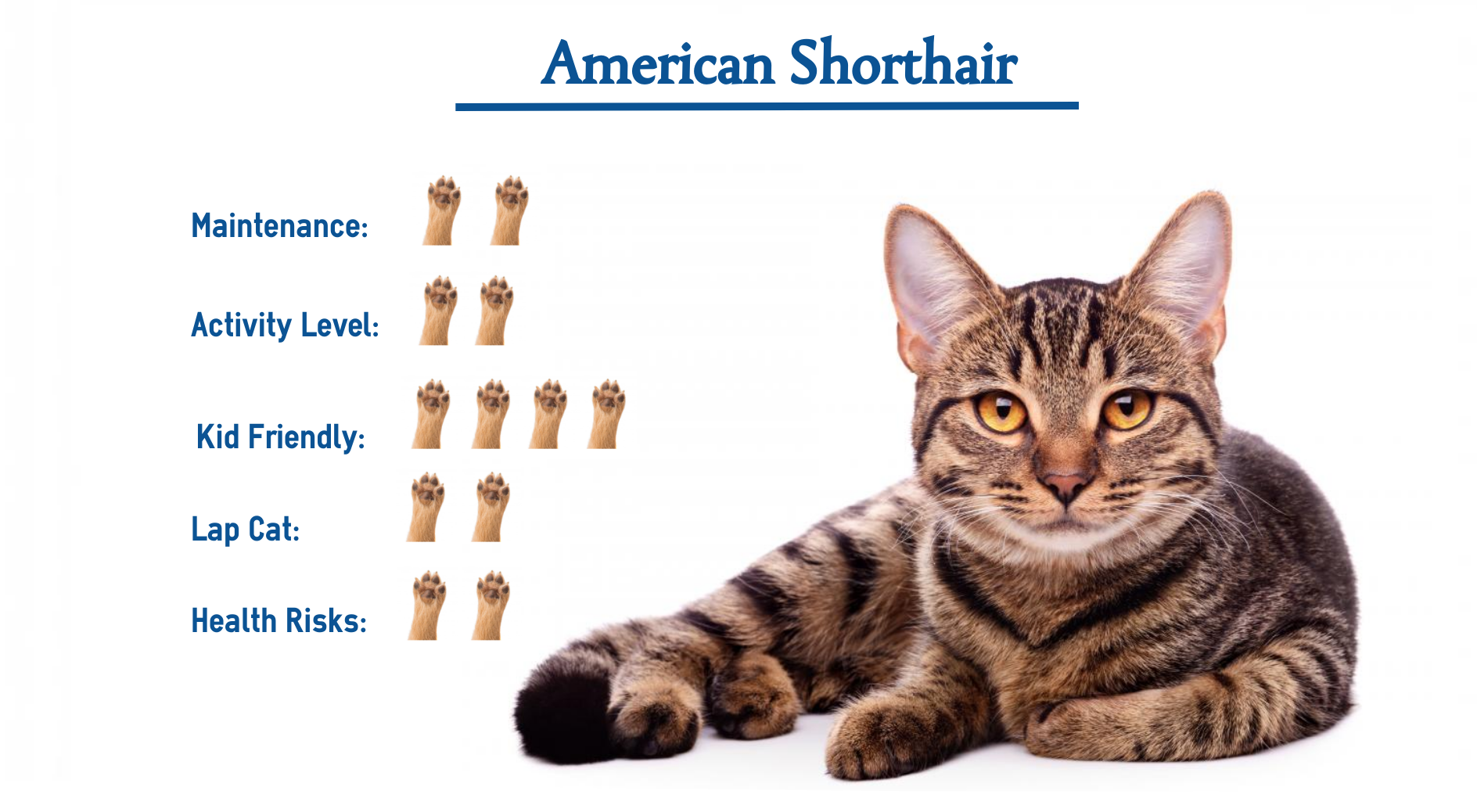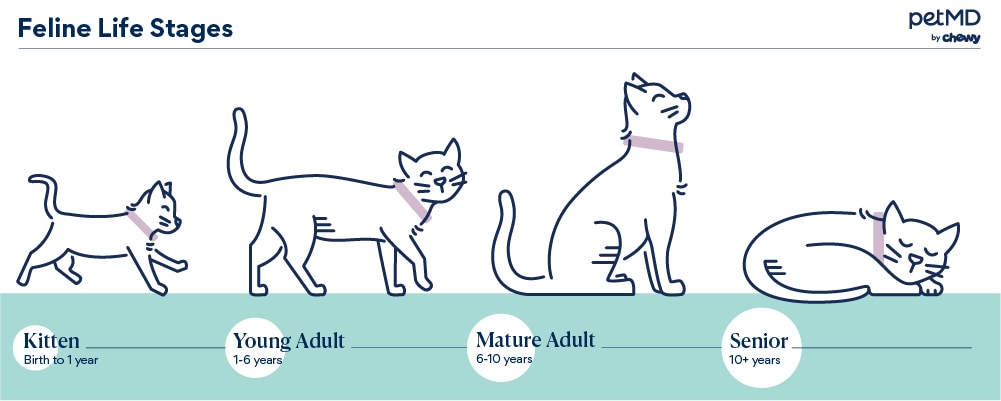Table Of Content

While overweight cats may be cute, obesity has a direct correlation with quality of life and life expectancy. Obesity is the most common disease in cats, though it’s preventable. Adequate exercise is possible to do inside your home — try playing fetch, playing with a laser pointer, and even putting out battery-operated toys that flop around to mimic prey. Keeping your cat fit and healthy will give him a longer and better quality of life. While you can’t control how long your cat lives, you can take steps to promote good health that may increase its chances of either avoiding or recovering from illness. According to Rutherford, good nutrition, regular veterinary checkups and health screenings are all key to extending your cat’s lifespan.
What Is the Average Lifespan of the Common Cat?
The length of your pet’s life depends on a number of factors, including healthcare, diet, and environment. We’ve looked at the environment and your cat’s breed as two important factors in the lifespan of a cat. But we also know that the cat’s overall health and any pre-existing or chronic health conditions can play a significant role in limiting that cat’s quantity and quality of life. They bring us so much joy and unconditional love, and they are our best friends and steadfast companions. But we must be realistic when asking how long cats (Felis catus) live. We know that pet ownership is a serious responsibility, and the goal is to provide the best quality of life that we can.
What are Common Health Issues as Cats Age?
Obesity increases the risk of health problems so be vigilant and remember failure to lose or gain weight despite diet is a sign of disease so consult with a veterinarian if this is the case. Cougars, coyotes, raccoons, and even birds of prey may come after outdoor cats. Even a small injury inflicted by one of these animals can be fatal if it gets infected. Indoor cats are not exposed to as many risks since they are sheltered inside a secure home. They originate from the Near East countries where they were domesticated from wild cats to help control rodent populations.
What is the Life Expectancy of Cats?
Dental diseases in cats culminate in tooth resorption, and many senior cats have fewer teeth. Tooth loss is painful and impairs the cat’s ability to eat normally. Cat treats and food formulas designed for older cats feature a soft consistency that is easy to chew. With advances in modern medicine, modern diets, modernized kitty products, modern indoor living, etc. cats, as well as other pets, are living healthier for longer.
Your Kids Will Love These Animal-Themed Toys
Blood pressure can be easily monitored at your cat’s annual checkup. Changes in behavior may be noted with regards to litter box use and nighttime activity levels. For example, some older cats will be more active late at night when they didn’t used to be and then sleep more during the day. Or, cats that were once fastidious about their bathroom habits may no longer cover their poop or may go outside the litter box. So, looking at the chart, we could say that a one-year-old cat would be like a 15-year-old human adolescent. A two-year-old cat would be similar to a 24-year-old, and thereafter, each year of your cat’s age will be roughly four human years.
How Long Do Stray Cats Live?
Let’s dive into how long cats live, if it matters if they live indoors or outdoors, and more about life expectancies based on the different breeds. Kittens are fun, full of energy and love exploring the world; they need a positive outlet for all that energy. Kittens are also particularly susceptible to parasites and infectious diseases. The chances are if you’ve adopted a cat, they are fixed or neutered. Spaying and neutering reduces the animal’s risk of cancer of the reproductive organs.
Cats are born with an innate love for running around, climbing and jumping, batting toys around, and often getting into mischief. You can keep your cat's cognitive abilities high by giving them lots of playtime and toys. Their love for physical activity is something that needs to be supported in order to promote a long and healthy life for your cat. Depression is not fatal and does not directly affect life expectancy in cats. Chronic kidney disease (CKD) is senior cats’ most widespread metabolic condition. The exact cause of CKD is unknown, but older age is a significant contributing factor.

How Long Do Cats Live in Human Years?

Good care is the foundation for a long and healthy life for your pet. Some cats are considered indoor pets, others are strictly outdoor pets, and others still will be indoor/outdoor pets that split their time between environments. The daily risks that outdoor cats take are much higher than those of an indoor cat, so the lifespan of an outdoor cat is often cut short.
While we often hear about cats living into their late teens or even early 20s, such ages are not necessarily typical or average. It’s part of the responsibility of pet ownership to provide proper healthcare for your cat. The average vet care expenses for cat owners is roughly $125 per year. However, this is an average that does not account for your particular cat’s health. Some cats will need emergency treatment or surgery that can cost significantly more than $125.
Animal Files: Why cats should be kept indoors - Reno Gazette Journal
Animal Files: Why cats should be kept indoors.
Posted: Mon, 03 Aug 2015 07:00:00 GMT [source]
Today, many believe the concept of nine lives has to do with luck. The information is current and up-to-date in accordance with the latest veterinarian research. This is especially pertinent now, with roughly 20 percent of cats in the US estimated to be 11 years or older.
Cats primarily eat meat, so they are considered obligate carnivores, and this should be reflected in the food we feed them. A lot of research has been done to determine the dietary needs of a house cat, so the food options that are available to cat owners are plentiful. During this stage, your cat should visit the vet at least once per year to stay up to date on vaccines and receive routine health checks. A cat that is 6 years old is equivalent to a 40-year-old human.
The good news is with proper care (and lots of love), you can improve your pet’s chances of staying healthy for years to come. Dr. Brittany Kleszynski is a freelance veterinary and medical writer who specializes in creating meaningful content that engages readers and speaks directly to the intended audiences. She writes and edits educational articles for pet parents and creates continuing education and online learning modules for healthcare professionals. She has worked in research and small animal practice since graduating veterinary school and is a member of the American Veterinary Medical Association.
Your cat may need medical treatment for their health problems, comfier beds to support their joints, and a specialized diet adjusted to their needs. Pet parents need to monitor grooming behavior, hairballs, and weight changes closely. Attention should be paid to oral health, and dental cleanings should be considered at this age at the discretion of your veterinarian, especially in cats resistant to routine tooth-brushing. It’s important to keep cats up to date on their vaccines and routine examinations, even though this age group is relatively resistant to illness. That said, certain diseases such as asthma and lower urinary tract disease (FLUTD) are more commonly diagnosed at this age. Catching these issues early can lead to much more successful long-term management, and baseline bloodwork can help establish normal values to compare to as your cat ages.
The more time a cat spends outside, the greater the risk is of an injury or illness from that environment. Your veterinarian is a partner in pet care, an expert who’ll offer hands-on guidance from the kitten days to the senior years. They’ll guide you on how to promote a happy, healthy life at home and help to recognize warning signs before they evolve into serious health concerns. Just like people, cats are susceptible to chronic health conditions that can shorten their lives and impact their standards of living. A good vet will ensure you’re doing everything you can to maximize your time with your pet without causing them undue stress or suffering. There are many factors that influence feline longevity including breed, spay/neuter status, nutrition, and veterinary care.

No comments:
Post a Comment